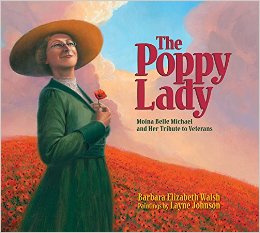

Memorial Day is on its way!
The Poppy Lady: Moina Belle Michael and Her Tribute to Veterans
By Barbara Elizabeth Walsh
Paintings by Layne Johnson
There is a saying that things can be lost in the “fog of war.” People are certainly lost, families disrupted and freedom compromised.
But there are people, thank goodness, that have the conviction that, in some sense, everything is not lost, as long as memory of what was lost is commemorated, revered and remembered.
Almost one hundred years ago, a woman named Moina Belle Michael, via a small red poppy did just that. And the legacy of her commitment echoes down the years to 2016. You can still see it, for it will be visible this coming May 30, on Memorial Day in parades, town bandstands and lapels, if you look for it.
Ms. Michaels had a motto that she relied on since her youth, and I believe it is a motto worth sharing with young readers today. Her motto said, “Whatsoever your hands find to do, do it with all your might.” Fine words for a new generation that is struggling in some sense to find its way true north. Heck, even we parents are still muddling through at times. aren’t we all on a learning curve together?
A school teacher from Georgia during WWI, Ms. Michael felt family and friends that were part of this “War to End All Wars”, were in need of a symbol. They needed a symbol that spoke to the courage and sacrifice involved in war.
She began a campaign to designate the poppy, the scarlet flower that spotted the famous Flanders Fields of Belgium, where so many fallen soldiers were buried, as such a symbol.
She imagined the poppy as a symbol for a lasting lifetime reminder of the sacrifice of war. And she accomplished that.
From a magazine left on her desk, Ms. Michael read the turned down page that marked a poem written by Lt. Colonel John McCrae. A Canadian physician, frustrated by the many lives he could not save, he wrote, “We Shall Not Sleep.” The version she saw happened to be illustrated in color, and she was struck by the red poppies that covered a field awash with white crosses, unnamed. The last lines of the poem stuck with her:
“Take up our quarrel with the foe:
To you from failing hands we throw
The torch; be yours to hold it high.
If ye break faith with us who die
We shall not sleep, though poppies grow
In Flanders Fields.”
Turning over the poem in an envelope, she wrote on its flap this pledge:
“And now the torch and poppy red
We wear in honor of our dead.
Fear not that ye have died for naught,
We’ll teach the lesson that ye wrought
In Flanders Fields.”
Working with primary sources, experts and the great-nieces of Ms. Michael, the picture book author uncovered the story of this remarkable woman of dogged determination.
Referencing the poppy as the Miracle Flower, the author also interviewed veterans and their families, and members of The American Legion and The Veterans of Foreign Wars.
Illustrator, Layne Johnson, whose own father, brother and uncles served in WWII, had his biggest inspiration from an art teacher he had in high school that served as a B-24 bombardier in WWII.
Named by Bank Street College of Education among “Best Children’s Books of the Year” in 2012, part of that honor must certainly go to Mr. Johnson.
His paintings in this picture book of such events as the sinking of the British ship, the RMS Lusitania, in March 1917 with 128 American lives lost, setting the U.S. entry into WWI in motion in April of the same year, Lt. Col. John McCrae, kneeling amid crosses set in a flood of red poppies in Flanders Fields, juxtaposed with Ms. Michael “poppy hunting” in novelty shops in New York for artificial poppies to represent the real ones in Flanders Fields, is clearly done with respect and reverence to this woman on a memory mission. His subject is realized with both humanity and honor – and beauty. Well done!
This Memorial Day, May 30, 2016, please let your young reader discover the legacy of the woman named Moina Belle Michael that took a poppy, and made it a yearly paper preserved patriotic symbol, both to veterans of foreign wars, and to all lives lost in the “fog of war.”
And if you see a poppy, please pin one on!
Maybe the poppy field in the “Wizard of Oz,” set on the route directly before the glorious Emerald City was no mere coincidence! How oddly prophetic that field of poppies also featured largely in this children’s classic written in 1900, some 15 years before the events that set the world at war.
And it is the poppy that, instead of lulling us into forgetfulness and sleep, as it does Dorothy in “The Wizard of Oz”, in Ms. Michael’s picture book, it serves as a reminder of what and who should be remembered, as classic children’s books still are – with love!

This is an important reminder of why we celebrate, not just grill and shop– but also to mark and to remember.